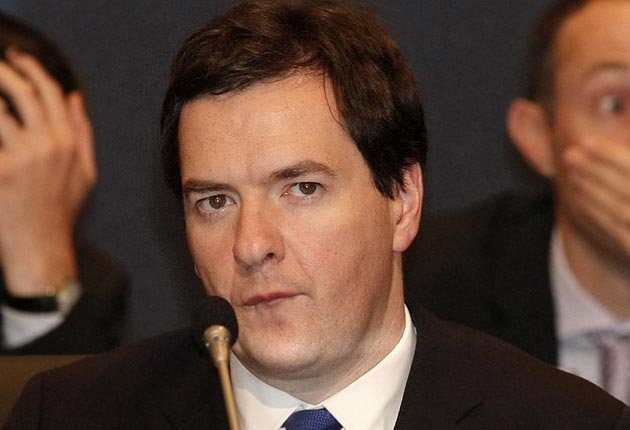Andrew Grice: Osborne has placed a series of landmines on the road to re-election
Inside Politics

Last Thursday was ringed in my diary with the words "general election?" I pencilled it in when the May election resulted in a hung parliament and there seemed every chance that a minority Conservative government would soldier on until David Cameron asked for a proper mandate and a second election.
After a momentous week which will define British politics until the next election, it is worth pausing to think what might have happened if Mr Cameron had not decided by 7 May to go for a full-blown coalition with the Liberal Democrats rather than a deal under which they would support the Tories in key Commons votes.
There would have been turbulence on the financial markets. Maybe not a Greek-style meltdown, but surely some trouble. Interest rates might well have been higher. Britain might well have lost its AAA rating. The cost of servicing the nation's debt would have gone up rather than falling to its lowest level in a generation. Many Tories warned the voters that a hung parliament would result in weak government and economic instability. "A vote for the hung Parliament party is a vote for politics behind closed doors, indecision and weak government, a paralysed economy, yet another election..." Mr Osborne said.
Presumably, he now disagrees with himself. The £81bn cuts announced by the Chancellor on Wednesday may well be an economic and political gamble. But no one can accuse the Coalition of weak government. Such strong medicine could not have been administered by a minority government knowing that it would soon face another election. People should bear that in mind when it comes to next May's referendum on whether to ditch the first-past-the-post voting system.
In his Commons statement, Mr Osborne conjured up a trick of which Gordon Brown would have been proud: the average cut in departmental spending will be 19 per cent, lower than the 20 per cent implied in Labour's deficit-reduction strategy. It was almost too clever for his own good. Tory MPs loved it so much that they appeared to be cheering the cuts, an image that may return to haunt them.
The Chancellor's closing flourish may make it harder for Labour to attack his measures, and to portray the Tories as cutting for ideological reasons, because Labour would have had to do something similar if it had retained power. Yet it also muddied the waters. Sparing the budgets of other Whitehall departments by hitting welfare harder may play well with voters who think benefit claimants are scroungers. But it undermined the Coalition's attempt to say the cuts were "fair", and the Institute for Fiscal Studies judged them as regressive.
Sensible Tories spotted another downside. The cuts had to be spread out over four years, not least because the economy is still so fragile, which is why Labour would go slower. Legislation is needed for many of the measures and they can't all be introduced overnight.
But in delaying some of the economic pain, has Mr Osborne ensured several doses of political pain for the Coalition parties in the run-up to the next election?
VAT will rise in January. Controversial cuts to housing benefit are due to take effect next April. In 2013, two years before the election, top rate taxpayers will lose their child benefit and the first sick and disabled people will lose their employment support allowance under the time limit introduced 12 months earlier.
"George Osborne said it would be a hard road; what he didn't say was that he had planted lots of bomblets all the way along it," one minister said yesterday.
Despite that, the road ahead for Labour is not easy either. The IFS verdict may bolster its strategy of presenting itself as the only progressive party at the next election. But some Labour MPs are blinded by the electoral damage they are sure the cuts will cause the Liberal Democrats they now love to hate. They talk as if the 2015 poll is already in the bag. It is not.
Voters fear the consequences of the cuts and are not convinced the deficit must be addressed so quickly. But the polls and focus groups also tell all the parties that the public accept that the deficit must be tackled. Moreover, they put the blame for it largely at Labour's door, as our ComRes survey highlights today.
Labour, looking inwards as it chose its new leader, let the Tories and Liberal Democrats win the argument by portraying the nation as sinking in a sea of debt. Governments are not like households and don't have to balance the books in the bad times, but Margaret Thatcher's household economics are back in fashion.
More seriously for Labour, it allowed the Coalition a free hit in the blame game. It is too late now for Labour to whinge about the global crisis. Voters know it happened on Labour's watch. So, however much people hate the cuts, Labour will not regain power until it first regains economic credibility.
A hard road ahead
January 2011: VAT rises by 2.5 per cent to 20 per cent
April 2011: Employee national insurance contributions rise by 1 per cent.
Housing benefit limits introduced, forcing families in expensive rented homes to move to cheaper accommodation. Child benefit frozen for three years Benefits, tax credits and public sector pensions rise by consumer prices index rather than retail price index (which rises faster)
April 2012: One-year time limit introduced for claimants of employment support allowance (ESA) judged able to work in future
October 2012: Reductions in disability living allowance
January 2013: Child benefit removed from families with a higher ratepayer
April 2013: Introduction of £500-a-week ceiling on benefit payments for any family, in line with median after tax earnings
May 2015: Next general election

Join our commenting forum
Join thought-provoking conversations, follow other Independent readers and see their replies